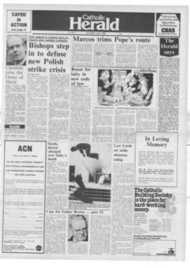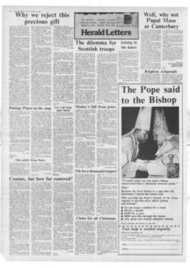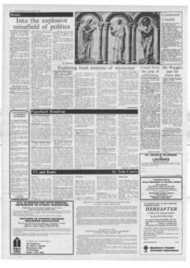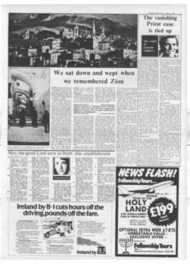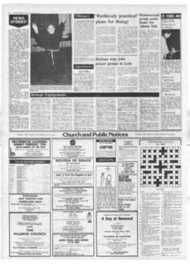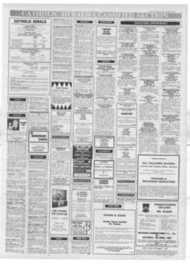Page 5, 13th February 1981
Page 5

Report an error
Noticed an error on this page?If you've noticed an error in this article please click here to report it.
Tags
Share
Related articles
Films By Freda Bruce Lockhart
Gallant And Gentle Cinema Critic
Award For Herald Film Critic
Sir Alfred Hitchcock Dies
At The Cinema*******a
THE REEL WORLD OF FILM CRITIC FREDA BRUCE LOCKHART
EXACTLY 20 years ago this month Freda Bruce Lockhart wrote her first film reviews for the Catholic Herald. She included a piece on the latest charmer starring Maurice Chevalier and Sophia Loren and another typically pithy paragraph on some tawdry
sextravaganza called "Nymphettes". Variety, you see. the spice of a critic's life.
By 1961, of course, Freda had long since established herself as one of Britain's leading experts on the artistic, pretentious, trivial and serious world of the movies.
She began her working life in the 1920s as an actress. For seven years she toiled away, as she says, "becoming a successful understudy."
"I got to the stage where I could get jobs understudying any star in London, more or less. But I couldn't get anyone to give me a part to walk on. My' only moment of fame was that I did play for Gertie Lawrence for some days in her first really serious play."
She decided that what she really wanted to do was to write about films and the theatre. She applied to Film Weekly, "the most serious of the fan magazines", but they turned her down because they thought she was too highbrow. So instead she got a job in the feature editor's office of the old Daily Sketch.
Her big break came soon enough when the woman who normally did the film criticism went on holiday. "I got a double spread of films to do and after the first week the editor sent for me, very angry, and said I had given the spread to people who didn't advertise with us. So I said 'Oh well I expect they will' and of course they did, the next week."
Further vindication followed: the editor of Film Weekly phoned up, saying he had seen her piece and was she still interested in a job. She was.
It was then about 1936, and the job lasted until the day the war broke out. Film Weekly was closed and Freda moved to the Government's office of censorship and then to the BBC to work in the Danish section, covering Scandinavian news.
Her next move — still during the war — was to Time and Tide as assistant editor. There she stayed for two years. It
seemed her connection with films was over. since she had become much more interested in politics. particularly foreign politics.
However, fate stepped in in the form of a chance visit to the golf club. where she picked up a copy of the Tatler. It coincided with the death of their film critic "and for once in my life I wrote at once and I got the job." She did it for the next seven years, during which time she also started to do a programme on the BBC called "The critics." The programme became a regular commitment for about 10 years "and it was somewhere about then that I began doing things for the Catholic Herald."
What many Herald readers were unaware of then — and still are now — is that by that time Freda was confined to a wheelchair — the result of contracting multiple sclerosis. The, disease struck without warning. "I was at a tea party at a cinema — now the Marble Arch Odeon — when somebody said to me 'watch what you're doing' and I found I was pouring my tea all over everything.
"It progressed very quickly. I couldn't write with my right hand for about three months. Then it moved right round to my legs and got very tiresome. I was walking on sticks and I started to fall about. One day fell down in Piccadilly Circus and I thought this was terribly embarassing for everyone who was with me. So I got a wheelchair."
She insists that she is lucky compared to many and that she gets no pain. She has also used the experience to produce something of practical use, in the form of a handy book called 'London for the Disabled.'
The book first came out in 1967 and was last reprinted ten years ago. It is a mine of information with sections covering libraries and lavatories, alleries and greyhound racing, shops and cinemas — and a good deal else. Last year, on the eve of the International Year of the Disabled. the publishers perversely allowed it to go out cf print.
"I was very angry about it." she says, "because it has not been replaced. It was by no means ideal but it was such a good idea that someone should have done it better." Would she have been prepared to update it now? "Yes. I would have been glad to do it.
The conversation turned back to films. She paused over the inevitable question asking her what sort of films she liked best. "Personally I think the French are the best film makers in the world. What I like about French films is that they nearly always make them as films. They are very seldom adaptations of books or plays or anything else and I think that is terribly important.
"It used to be a sort of cliche
that everyone knew — that the best films are made from original stories. Now they don't seem to think that any more. I know that it is almost impossible for people to sell an original film story — it must have a ready-made market. This is a terrible thing."
Later she added: "The sort of films I like are those inspired by or, in the phrase of Pater, "aspiring to the condition of music" or of poetry rather than those of drama or of prose — more like music or painting than like a book."
Does she like showbiz people? "Yes I do. I think they are ridiculous but I like them. I don't think they are brilliant or wise but they are generous and long-suffering and, yes, they're frightfully nice."
I asked her if she saw writing in the Herald as a kind of preaching. She thought for a while, and then quoted a comment by another critic: .."A critic owes nobody anything except his editor and the art he serves.' I don't think you want to preach but obviously you have got to consider what you think the paper would or should be doing or saying. And I think you have to make a value judgment of your own."
She'll be writing for us again next week. And again a fortnight later. Here's to the next 20 years.
blog comments powered by Disqus


